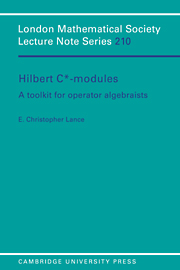Book contents
- Frontmatter
- Contents
- Preface
- 1 Modules and mappings
- 2 Multipliers and morphisms
- 3 Projections and unitaries
- 4 Tensor products
- 5 The KSGNS construction
- 6 Stabilisation or absorption
- 7 Full modules, Morita equivalence
- 8 Slice maps and bialgebras
- 9 Unbounded operators
- 10 The bounded transform, unbounded multipliers
- 11 What next?
- References
- Index
7 - Full modules, Morita equivalence
Published online by Cambridge University Press: 19 September 2009
- Frontmatter
- Contents
- Preface
- 1 Modules and mappings
- 2 Multipliers and morphisms
- 3 Projections and unitaries
- 4 Tensor products
- 5 The KSGNS construction
- 6 Stabilisation or absorption
- 7 Full modules, Morita equivalence
- 8 Slice maps and bialgebras
- 9 Unbounded operators
- 10 The bounded transform, unbounded multipliers
- 11 What next?
- References
- Index
Summary
Many properties of a C*-algebra (anything K-theoretic, for instance) are unaffected if the algebra is tensored with K. Given a C*-algebra A, we call K ⊗ A the stable algebra of A. A C*-algebra B is called stable if B ≅ K ⊗ B. Of course, the stable algebra of A is always stable since K ≅ K ⊗ K. Two C*-algebras A, B are said to be stably isomorphic if their stable algebras are isomorphic. In this short chapter we shall prove a theorem of Brown, Green and Rieffel which characterises stable isomorphism for σ-unital C*-algebras in terms of a relation called Morita equivalence. We shall not investigate Morita equivalence in any systematic way, but just develop enough of its properties to prove the main theorem. For a fuller treatment, see [Rie 1], [Rie 2], [Bro], [BroGreRie].
Before defining Morita equivalence, we need to investigate some properties of full Hilbert C*-modules. A Hilbert A-module E is said to be full if the ideal 〈E, E〉 is dense in A.
Our first result about full Hilbert C*-modules involves a construction that will be relevant to the notion of Morita equivalence. Let A be a C*-algebra and let E, F be Hilbert A-modules. Under the natural operation of composition of mappings, K(E, F) is a right K(E)-module. (In the same way, k(E, F) is a left K(F)-module. This K(E)-K(F)-bimodule structure is central to the study of Morita equivalence.) Set B = K(E) and G = K{E, F).
Information
- Type
- Chapter
- Information
- Hilbert C*-ModulesA Toolkit for Operator Algebraists, pp. 69 - 75Publisher: Cambridge University PressPrint publication year: 1995
